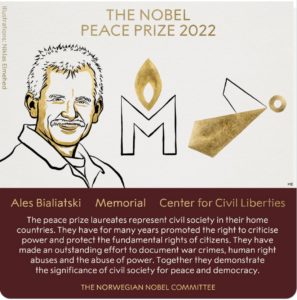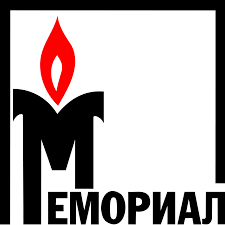Jailed Belarusian activist Ales Byalyatski, Russian rights group Memorial and Ukraine’s Center for Civil Liberties won the 2022 Nobel Peace Prize on Friday, amid a war in their region that is the worst conflict in Europe since World War Two, Reuters reports.
“The peace prize laureates represent civil society in their home countries,” said Berit Reiss-Andersen (below), the chair of the Norwegian Nobel committee. “They have for many years promoted the right to criticize power and protect the fundamental rights of citizens.”
Exiled Belarus opposition leader Sviatlana Tsikhanouskaya, visiting Paris, told The Associated Press she felt “honored and delighted” that Bialiatski was among the laureates. “For sure, it will attract more attention to (the) humanitarian situation in our country,” she said.
 Bialiatski was first arrested in 2011 and spent three years behind bars on tax evasion charges he and his supporters viewed as direct retaliation for the activities of Viasna, which was instrumental in helping Belarusian civil society to keep track of the biggest crackdown in the country’s modern history after the protests of 2020, the Washington Post reports. Bialiatski founded the Viasna center in 1996 to track cases of persecution of activists and documents torture and abuse against political prisoners by Belarusian law enforcement.
Bialiatski was first arrested in 2011 and spent three years behind bars on tax evasion charges he and his supporters viewed as direct retaliation for the activities of Viasna, which was instrumental in helping Belarusian civil society to keep track of the biggest crackdown in the country’s modern history after the protests of 2020, the Washington Post reports. Bialiatski founded the Viasna center in 1996 to track cases of persecution of activists and documents torture and abuse against political prisoners by Belarusian law enforcement.
“Huge congratulations to a remarkable human rights activist and courageous organization @viasna96,” the National Endowment for Democracy’s President and CEO Damon Wilson tweeted.
Congratulations to Belarusian human rights defender & political prisoner Ales Bialiatski for receiving the 2022 #NobelPeacePrize. The prize is an important recognition for all Belarusians fighting for freedom & democracy. All political prisoners must be released without delay. pic.twitter.com/szxmB5YG5g
— Sviatlana Tsikhanouskaya (@Tsihanouskaya) October 7, 2022
Ukraine’s Center for Civil Liberties originally launched the Euromaidan SOS initiative to document and publicize human rights abuses during the wave of anti-government protests in 2013 and 2014, the Post adds. Since then it has focused on events related to Russia’s annexation of Crimea in 2014 and its backing of separatists in the eastern Donbas region of Ukraine. The group – a recipient of this year’s National Endowment for Democracy’s Award – has created a map of forced disappearances across Ukraine.
Oleksandra Matviichuk, the organization’s head, said on Facebook she was “happy” that the Center had received the prize “together with our friends and partners.” She also called for the creation of an international tribunal to prosecute Russian President Vladimir Putin and Belarusian President Alexander Lukashenko for war crimes.

The third recipient, the Russia Memorial group, was shut down by the Kremlin last year, in what was widely seen as a watershed moment in Putin’s crackdown on independent thought, the Guardian reports:
 Memorial was founded in the late 1980s to document political repressions carried out under the Soviet Union, building a database of victims of the Great Terror and gulag camps. At the time of closure, Memorial was the country’s oldest human rights group. The news that Memorial won the Nobel peace prize came as a court in Moscow was holding a hearing on seizing the group’s assets.
Memorial was founded in the late 1980s to document political repressions carried out under the Soviet Union, building a database of victims of the Great Terror and gulag camps. At the time of closure, Memorial was the country’s oldest human rights group. The news that Memorial won the Nobel peace prize came as a court in Moscow was holding a hearing on seizing the group’s assets.
Tanya Lokshina, the Europe and Central Asia associate director at Human Rights Watch, called the decision “a great gesture of solidarity with rights groups besieged by autocrats”.
The three winners “have made an outstanding effort to document war crimes, human rights abuses and the abuse of power. Together they demonstrate the significance of civil society for peace and democracy”, the head of the Norwegian Nobel Committee, Berit Reiss-Andersen, told reporters.
“Congratulations to the 2022 Nobel laureates! #NEDemocracy stands in solidarity with the advocates and organizations dedicated to the pursuit of freedom and democracy,” the NED tweeted.







